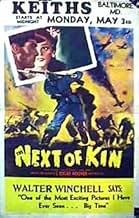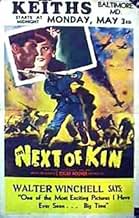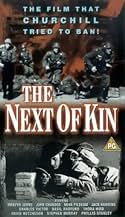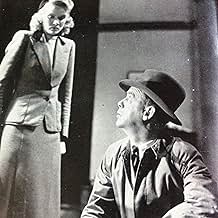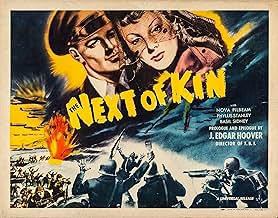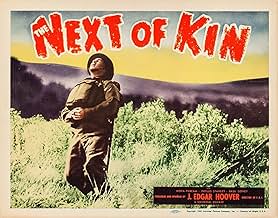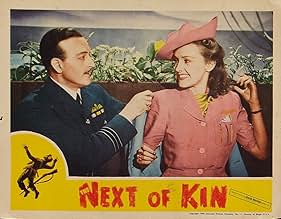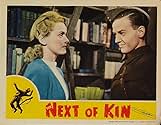A gossipy housewife is overheard talking about what her son is doing by a Nazi spy.A gossipy housewife is overheard talking about what her son is doing by a Nazi spy.A gossipy housewife is overheard talking about what her son is doing by a Nazi spy.
- Awards
- 2 wins total
- No. 23 (Mr. Davis)
- (as Ft. Lt. Mervyn Johns RAF.VR.)
- Maj. Richards
- (as Sqn-Ldr. Reginald Tate RAF.VR.)
- Mr. Barratt
- (as L/C Stephen Murray RASC)
- Intelligence Officer
- (as Ft-Lt. David Hutcheson RAF.VR.)
- Brigade Major Harcourt
- (as 2nd. Lt. Jack Hawkins RWF)
- German General
- (as Lt. Torin Thatcher R.A.)
Featured reviews
The theme in the movie is essentially for military folks to keep their mouths shut and their wits about them, as Nazi agents might be about their country in order to report all that they see to their bosses back in Germany. Again and again through the course of the picture, you see some Brits working hard to stop the German spy apparatus but far more who unwittingly help the enemy through their own stupidity.
I really appreciated how the film passed on an essential message without making the Nazis like the usual snarling villains in war films. I also appreciate how intelligent the script is. In fact, the only things I didn't love about the film was some of its use of stock footage near the end....which is a real shame since they did a great job of creating realistic looking battle scenes. Well worth seeing.
By the way, you can sure tell this was NOT made in Hollywood, as you get a brief glimpse of boobs as well as having a curse word. This is not to say British films of the era had an anything goes style...British censorship was very strong...just not regarding a curse word or showing a book with a bare chested lady on the cover.
The paradoxical result was that a film at first only intended for strictly limited circulation amongst those with security clearance became a great box office hit. Equally paradoxical was the degree of really quite startling realism - especially for the time - with which it convincingly presented certain uncomfortable realities of war to the domestic audience; the only concession to any kind of comforting assurance being the explosive finale when, despite horrifying casualties amongst the invasion force whose plans have been compromised by enemy agents, the commandos are able to press on and successfully sabotage their strategic military objective on the coast of occupied France.
The location filming of authentic training manoeuvres in and around the Cornish village of Megavissey is superb, and does not pull its punches in showing bodies blown to bits, etc. The remarkable live sound recording gives a really stomach-tightening sense of the military hardware being unleashed: The sounds of the actual artillery, bombs, and powerful engines actually mobilized for War contribute to a far greater urgency than what audiences were used to. Even now, it is abundantly clear that CGI pyrotechnics, by comparison, just do not pack the requisite punch.
The script cleverly and effectively alerts its audience to the very real danger of 'careless talk' and even deals unblinkingly with such unsavoury real-life scenarios as a cocaine-addicted stripper being blackmailed into spying on her soldier boyfriend by her Nazi-sympathising dresser; or a cultivated bookshop owner who is in reality a ruthless Nazi agent, and perfectly prepared to blackmail his young assistant into obtaining information by threatening to arrange that her Jewish parents, whom she has had to leave behind in occupied Amsterdam when she became a refugee, are detained in 'protective custody;' or the mild little businessman from Wales who strolls around undetected and undetained throughout the film, stealing information with alarming ease, to the untold advantage of his country's deadly foe.
These Nazi spies are not the usual easily-defeated Prussian blockheads beloved of more naive propaganda films, but intelligent, sophisticated and well-trained agents, supplied with detailed cover, a network of contacts, and portable radios. They represent an all-too-believable and imminent threat to Britain's survival.
One cannot help reflecting that this clear-eyed view of Britain's predicament stands now in stark contrast to the present era of lies and dissimulation. Churchill thought - quite reasonably during such an extreme emergency - of banning this film, but eventually reconsidered, since the military authorities of the time were ultimately prepared to trust the people of Britain with something surprisingly close to the truth. I venture to state that, evidently, people were trusted more by their governors during the global crisis of a World War, when national survival unquestionably stood in far greater danger of sudden catastrophe, than they are today!
It's all being managed by people who run bookstores or are dentists, with accents that proclaim they are as English as John Bull. And their deadliest agent, who kills Nova Pilbeam -- Boo! Hiss! -- is worn-down, workaday Mervyn Johns.
The War Office commissioned this movie from Michael Balcon. He took the small amount of money, doubled it, made this rip-roaring yet somber spy drama. Once he recovered the money he had put into it, the profits went to the War Office, and there were plenty of profits. It was enormously popular, and rightly so, even if Churchill considered having it censored because it might destroy morale. If we can't trust each other, whom can we trust?
It all ends with an exciting race. The army is planning a massive raid. Johns has the aerial surveys. Can he get it to the German High Command in time for them to figure out where it will be and stop it? Or at least make it so difficult that death notices must be sent to the next of kin?
So keep your lip buttoned up. Even if you're Wayne Naunton taking to Basil Radford. Mervyn Johns might be listening.
Especially so long afterwards, 76 years later to be exact, it's immensely rewarding to see such an example of supreme realism all the way, of ordinary people, officers and soldiers, spies and victims, in their very various precarious situations, all under severe pressure, some under threats of death or worse, but all keeping on working and straining themselves for what everyone of them believes is for the best of all. The Germans are not depicted as crooks and villains, they are rather very well objectively filmed, like also the Britishers. They are all doing an extremely difficult job under extreme strain, and this was during the year when the war reached its deepest crisis. It is almost perfectly documentary in character all the way.
Did you know
- TriviaThe War Office asked Ealing to make a feature length training film for them on the subject of security, but provided minimal funds. Ealing more than doubled the budget from their own resources, to produce a film whose appeal transcended its military function. The very large profits from commercial distribution went first to repay this outlay, then to the War Office rather than Ealing.
- GoofsWhen Beppie meets her soldier boyfriend near his north of England training ground, he is standing by a Western National bus stop. Western National only operated in the South West of England, not the North.
- Quotes
Narrator: [Spoken as camera pans across dead soldiers after the battle sequence] The object of the raid has been achieved. Locked gates, oil storage tanks, harbour equipment were destroyed. One enemy submarine was put out of action, our own losses, both in men and craft were very heavy. The enemy had been warned. He was waiting for us. And although our troops fought throughout with great skill and gallantry, they were not able to effect the surprise that had been hoped for. They paid the price for bad security. The next of kin of causalities' have been informed.
- Crazy creditsSECURITY This is the story of how YOU - unwittingly worked for the Enemy, YOU - without knowing gave him the facts, YOU in all innocence helped to write those tragic words - 'THE NEXT OF KIN'
- ConnectionsFeatured in L'étrange aventurière (1946)
Details
- Runtime
- 1h 42m(102 min)
- Color
- Aspect ratio
- 1.37 : 1

